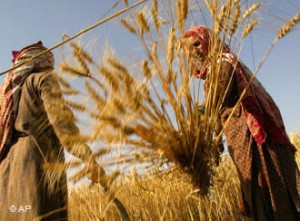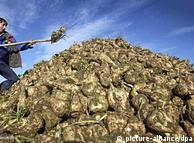World Food Day

Today is World Food Day, a yearly event organized by the UN’s Food and Agriculture Organization (FAO). World Food Day is meant to raise awareness about global hunger and poverty, and this year the focus is squarely on how soaring food prices are affecting the world’s most vulnerable and poor. The theme is ”Food Prices-From Crisis to Stability.”
Climate change has a big impact on food prices. As the global supply of staple crops like corn and wheat gets more expensive, the cost of food goes up too. And the hardest hit areas, according to the FAO, are usually the world’s poorest. The FAO hopes bringing awareness to the issue will spur leaders around the globe to take action and address the problem at its source. There’s a list of events on the FAO’s website with ways you, too, can get involved!
Cooking smoke a greater killer than Malaria
Lots of money and effort has gone into awareness raising, public health campaigns and law suits in a bid to wean the world off smoking. Lots of money and effort also continues to go into the prevention and treatment of malaria. But there’s another type of smoke that some three billion people around the globe can’t escape and that, according to recent findings, kills more than Malaria.
According to the World Health Organization almost half the world’s population cook their food and heat their homes using open fires or leaky stoves that run on wood, coal or biomass. And nearly two million people die prematurely as a result of inhaling the smoke day in and day out. That makes it a greater killer than malaria. Women and children are particularly affected as they tend to spend more time at home while men are working outside.
But there are also other problems with open wood fires. They emit CO2 and the wood used for cooking is often logged unsustainably. GLOBAL IDEAS has reported on clean and safe alternatives.
Efficient stoves in Peru Click here to learn more
Solar cookers in India Click here to learn more
”Taste the Waste”
„Taste the Waste“ — Der Trailer from tastethewaste.com on Vimeo.
German director Valerie Thurn has come out with a new documentary called ”Taste the Waste” that highlights the effect of wasting food on the environment. It’s an eye-opening glimpse into the way food is produced and consumed around the world, and how much we end up throwing away. Did you know that 50% of all groceries end up in the trash? It’s not just at home, either – bakeries, supermarkets and convenience stores all end up tossing a big percentage of their products that aren’t sold.
Agriculture is one of the biggest culprits when it comes to greenhouse gases, and when half of it ends up in the garbage, it’s even worse: rotting food releases methane into the air, contributing to global warming. The US Department of Agriculture and CleanMetrics Corp. did this study to show how different foods produce greenhouse gases:

In the U.S. alone, people waste 55 million tons of food a year – about 40 percent of the food supply. So what can be done? Go check out the movie if you can, the director has some interesting solutions to the waste problem…
Waste to Wealth

A small Italian company called Bi-on has found a way to turn sugar beet molasses into plastic. They way it works is, they mix the molasses with a bacteria that feeds on sugar during fermentation. It creates lactic acid and polymers that can be used to create a biodegradable substance, a plastic called PHA.
The company’s offices are not far from Italy’s biggest sugar producer, so Bi-on has plenty of sugar beet molasses to pick up. There are other biodegradable plastics out there, but they’re often made up of food particles, not actual trash. The entire field is called bio-plastics, and the company’s new product could help the world become less dependent on the oil-based plastics we mostly use now. And one of the best features of Bi-on’s sugar beet plastic is that it can be destroyed in water, getting rid of the mounds of plastic and waste often seen floating in our lakes and oceans.
You can read more about the story on Deutsche Welle. Let us know what you think!
Chocolate No More?

The International Center for Tropical Agriculture just released a report that shows that the cocoa supply in West Africa is under threat. As our climate gets warmer and warmer, the soil heats up, and the normal patterns of rainfall are also changing quickly. Why is that important? Because Ghana and Côte d’Ivoire are home to half of the world’s cocoa supply.
According to the International Center for Tropical Agriculture, which is based in Cali, Colombia, by the year 2050 the amount of land that’s now used for cocoa production will be drastically reduced, and instead moved to different plots of land that don’t offer suitable growing conditions. And since the demand for chocolate is on the rise but production is falling, we’ll probably end up paying a lot more for the sweet treat.
The study’s authors recommend finding cocoa plant varieties that are heat-resistant and can adapt to changing climate conditions.








Feedback